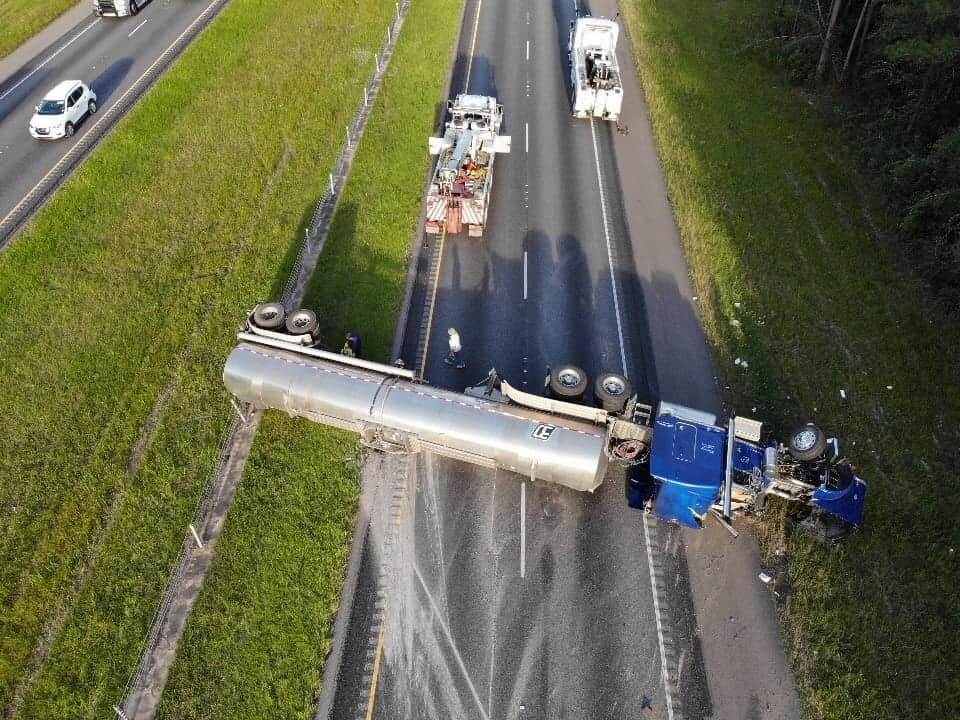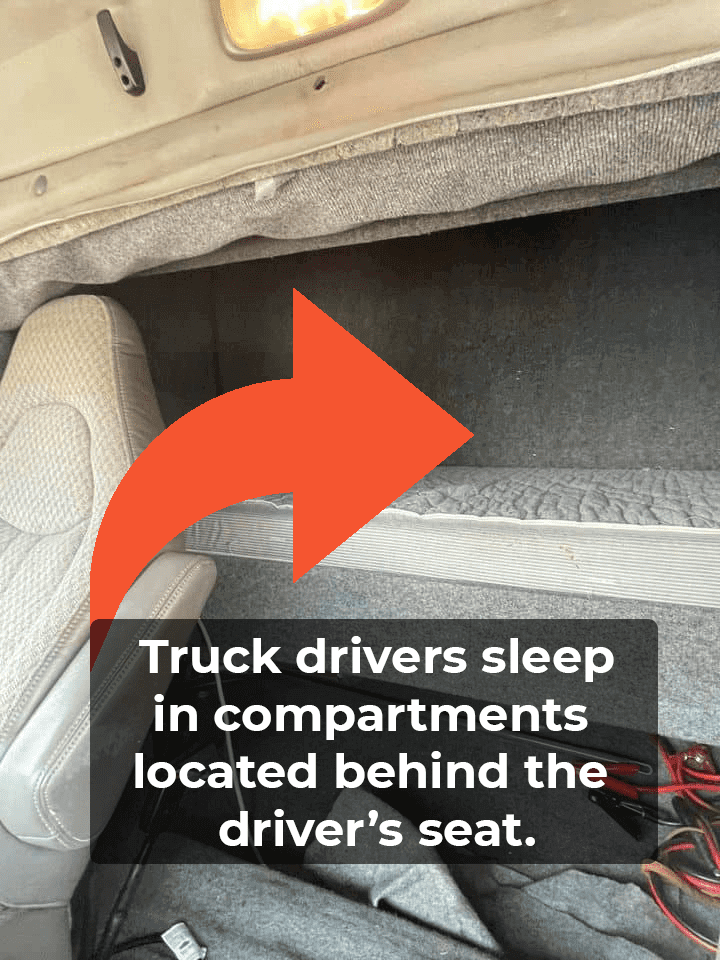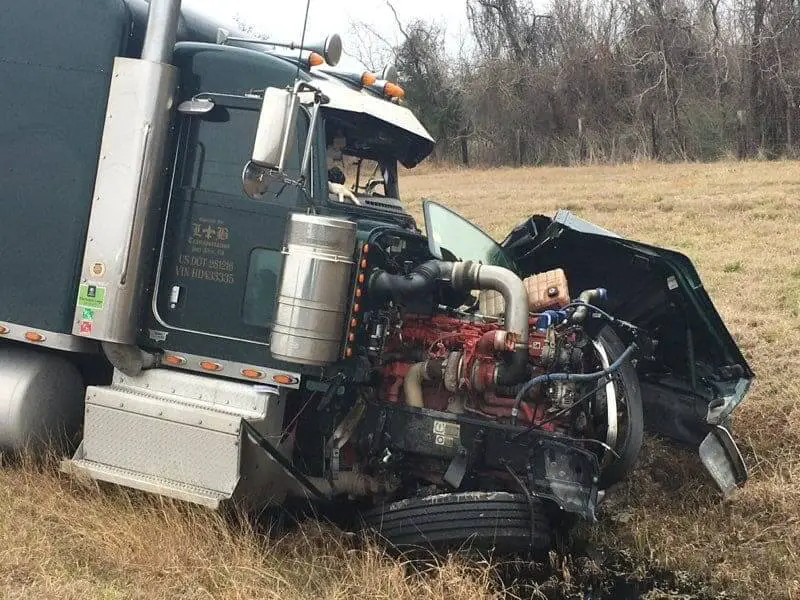Im of the opinion, and I believe there are statistics to back this up, that truck driving is one of the most dangerous professions in the world. Sure every profession has a certain degree of danger while on the job. Police officers, EMT's, Fireman, any profession that involves interaction's with dangerous situations are certainly risky when compared to an average desk job.
Truck Driver's however have to endure the highest level of uncertainty and one of the dangerous factors of all, that being traffic, erratic drivers, and even more.
That alone makes truck driving one of the most dangerous jobs a person could have, but this article is going to go even deeper and describe other major dangers that come with this line of work including health risks, irresponsible driving, and more which will answer the question, What are the dangers of being a truck driver?
So let's get right into this.

Trucks carry large weights of cargo which increases their chance of an accident on the road like the "rollover" seen above.
1. Health Risks
This is the most dangerous part of being a truck driver, unfortunately. The health hazards that are attached to truck driving are many and can sometimes be life-threatening. Common truck driver health risks include:
Obesity
You may have noticed that many of the truck drivers you’ve seen are overweight. Most of the time, it isn’t their fault. It's just the nature of the job.
A National Institute of Occupational Safety and Health (NIOSH) study of truckers in the United States found that about 69% of truck drivers in the country are obese. The cause of this unfortunate statistic is linked to the nutritional lifestyle of most truckers. Since they are mostly on the road, truck drivers don’t have time for regular exercise and healthy food. There’s also only so much good sleep they can get in a cramped truck cab. And all these are preconditions for weight gain.
Unfortunately, obesity doesn’t just come alone. When it isn’t tackled on time, it brings with it a host of other health problems like heart diseases and diabetes.
Diabetes Mellitus
Truck drivers have a 50% higher chance of having diabetes than the national average. This is a sad statistic, but it’s true.
Most of the food truckers eat on the road are carbs, which is understandable. Our body converts carbs into glucose, which it then uses as a source of energy. However, before the glucose can be of any use to the body, it has to first be absorbed into the blood cells with the help of insulin. This is where the problem originates.
A substantial percentage of the food truckers eat has insulin dampening effects on the body. And where there isn’t enough insulin in the body to aid the absorption of glucose into the cells, the glucose becomes excessive. And diabetes mellitus sets in.
Lung Cancer
Staying awake can be a major issue for truck drivers on long hauls. Highway hypnosis alone is enough to bore them to sleep. Solo truck drivers have it even worse, as they have no companion to talk to and pass time with. So, to keep sleep at bay, half of the truck drivers in the US resort to healthy means.
Unfortunately, the other half have resorted to smoking, according to a survey conducted on long-haul truckers by NIOSH.
It’s no news that smoking exposes you to lung cancer, and truck drivers are not exempted from this risk, regardless of how noble their reason for smoking is.
Musculoskeletal Injuries
This is one danger most truck drivers constantly face. Research by the University of Waterloo in Ontario discovered that about three in five truck drivers have had some kind of musculoskeletal pain in the past 30 days.
The cause of this saddening statistic is rooted in the job requirements of a truck driver. As a truck driver, you spend most of your time sitting on a spot. If your truck seat is not ergonomic or comfortable, you can’t escape musculoskeletal injuries. When driving on rough roads, keeping your hands on the steering wheel causes your joints to vibrate incessantly, leading to pain there. When you have to load or offload, you may also have to do some heavy lifting, which also exposes you to back pain.
With all these combined, it is understandably quite hard to avoid musculoskeletal injuries as a truck driver. However, it is not completely impossible. Our article on how truck drivers can avoid back pain is a good place to start.
Depression, Anxiety, and Stress
Because depression and anxiety are not physical injuries, fewer people pay attention to them. However, these issues are just as dangerous as any other sickness any truck driver could face because depression and anxiety attack the mind.
Truck drivers don’t get to spend a lot of time with their families and loved ones. Solo truck drivers don’t even get to spend a lot of time with anyone. These could lead to loneliness, depression, and anxiety.
Also, the pressure trucking companies mount on truck drivers isn’t always healthy. In some companies, truck drivers are pressured, rather than encouraged, to do more work, make more hauls, and arrive at destinations quicker. But this pressure could have negative side effects of depression, anxiety, and stress on the truck driver.
2. Lack of Rest
Truck driving is very tasking on the body, and adequate rest is needed to keep the body from being fatigued. The FMCSA understands this, and it has made provisions for rest in its Hours of Service regulations. One of the rules states that a property-carrying driver “May not drive beyond the 14th consecutive hour after coming on duty, following 10 consecutive hours off duty.”
Now, you may think 10 hours is more than enough time to rest. So, why would truck drivers still drive tired? The reason is that the 10-hour break is not as much as it seems. The truck driver still has to spend an hour or two loading or unloading their haul. They still need to eat, use the restroom, shower, and attend to other basic needs. These should take another one and half hours. Parking spaces for trucks are often hard to find, even at truck stops. A trucker might spend up to an hour looking for a parking space big enough to git their rig. That’s up to four and a half hours gone.
Also, there’s a limit to how much good sleep one can get when they’re not comfortable. The truck cab is often cramped, and there usually isn’t enough space to get comfortable in. And if one even manages to get comfortable, many truck stops are not safe, with mischief always hanging around the corner. This could also contribute to the lack of comfortable sleep.
At the end of the day, the trucker ends up having less than an hour of a good rest, and they still need to put in their shift as soon as they wake up. Lack of rest then builds up, and fatigue replaces it.
If you want to read about where truck driver's sleep and how they get optimal rest on the road, check out this article we wrote all about how truck driver's sleep.

3. Getting Pinned Under the Trailer
Truck rigs are monstrously big, and getting pinned under one is enough to scare the living daylight out of even the most experienced truck drivers. But there are times when some repair works need to be done under the rig. So, what do you do?
The first way to escape getting pinned under a rig is to not even go under it at all. If there’s a repair that must be done, the truck driver should invite a trained mechanic for the job. But if you have to repair yourself, make sure there’s someone around who can help in case things go south.
4. Other Drivers
This, unfortunately, is a danger the truck driver has no control over. Like it or not, there will always be foolish drivers sharing your road. The best you can do is to play your role at being safe, and hope the others do the same. Keep a reasonable distance from vehicles around you.
5. Bad Weather Conditions
The weather changes very often. Despite the technologies we have to forecast the weather, the weather still sometimes goes against our forecast.
Bad weather and truck driving should never mix. Unfortunately, the combination is sometimes inevitable. The reason is that truck drivers are mostly under the pressure to keep to time. Apart from you wanting to log more miles, the trucking company also needs you to deliver your load as fast as possible. As a result, the option of trying to brave a “not-so-bad” weather condition is not completely off the table. But this is a huge risk.
Even if there was a slight rain, it could make the road slippery enough to make it hard for trucks to easily come to a stop, even when they're not overs-peeding. This is why we advise truck drivers to always have a weather app on their phones. The apps help them stay on top of weather updates and not be caught by surprise in a storm.
6. Wreckless Driving
Sometimes, the biggest danger to you as a truck driver is not a mechanical problem. It isn’t other drivers, and it isn’t the bad weather. Sometimes, the biggest danger to you as a truck driver is your irresponsibility.
When you refuse to take the necessary safety precautions, you’re only endangering your life, the lives of others on the same road as you, your freight, and other properties.

Drowsiness and Highway hypnosis can cause wreck less driving accidents with truck drivers
Conclusion
The dangers of truck driving are numerous, and they include health hazards, truck driver irresponsibility, and lack of rest. But this doesn’t mean a miserable future awaits all truck drivers.
It is our wish that all truck drivers return home to their families safe and sound after every shift.
